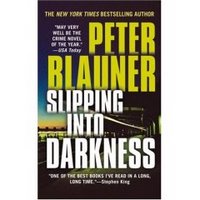 Peter Blauner is the author of six novels, including Slow Motion Riot, which won an Edgar Allan Poe award for best first novel of the year, and The Intruder, a New York Times bestseller and an international bestseller. His books have been translated into sixteen languages. His most recent novel is Slipping Into Darkness. For more information, visit www.peterblauner.com
Peter Blauner is the author of six novels, including Slow Motion Riot, which won an Edgar Allan Poe award for best first novel of the year, and The Intruder, a New York Times bestseller and an international bestseller. His books have been translated into sixteen languages. His most recent novel is Slipping Into Darkness. For more information, visit www.peterblauner.com
What book or project is coming out or has come out that you’d like to tell us about? I published a book earlier this year called Slipping Into Darkness, which will be coming out in paperback in February. It’s the story of two men and two murders. In 1983, a young female doctor is brutally murdered on the Upper East Side of Manhattan.
I published a book earlier this year called Slipping Into Darkness, which will be coming out in paperback in February. It’s the story of two men and two murders. In 1983, a young female doctor is brutally murdered on the Upper East Side of Manhattan.
A raw-knuckled detective named Francis X. Loughlin catches the case and quickly zeroes in on Julian “Hoolian” Vega, the seventeen-year-old son of the building’s superintendent, as his suspect. Francis puts Hoolian through a mind-bending interrogation and manages to get the kid to incriminate himself.
Twenty years later, Hoolian gets out of prison early at the age of thirty-seven, still very much a boy in a man’s body, thoroughly alienated from society. There’s another murder very similar to the first one. Same type of victim, same MO. And like the first victim, the woman who’s just been killed has traces of skin cells under her fingernails as if she scratched her assailant. Francis, on the verge of retirement and going through a health crisis, decides this will be a slam dunk. With the new DNA technology, it’s a cinch that he can just compare the samples and prove Hoolian was the killer in both cases. But the results blow up in Francis’s face, because: A) It turns out the sample does not match Hoolian’s profile. B) It doesn’t even come from a man. C) It turns that it’s actually the DNA of the first victim, killed twenty years before, that’s under the second victim’s fingernails.
Tell us about your journey to publication. How long had you been writing before you got the call you had a contract, how you heard and what went through your head.
I started writing seriously when I was around thirteen, shortly after falling under the spell of The Loneliness of the Long Distance Runner. Over the next seventeen years, I worked as hard as I could to become a good writer. I was in journalism for quite some time, because writers I admired, like Graham Greene and Ernest Hemingway, had done it, and also because I thought it would be a good way to pick up some worldly experience.
In any event, I had written a number of novels that didn’t get published before I finally got the call in 1990. I was on vacation with my wife at a hotel in Jamaica that didn’t have any phones in the rooms. On a whim one night, I went by the main desk and looked in the message slots. There was one thin pink piece of paper tucked under the room number. I took it out and saw it was from my agent. The rest, as they say, is history. It was something I’d wanted for a very long time. So what I mainly felt was not just joy, but relief that I wouldn’t have to keep wanting it. The irony and lesson, of course, is that the call only came because I wasn’t sitting by the phone waiting for it.
What are the elements of a good thriller?
I don’t know what the elements of a good thriller are. All I know is what I enjoy in a book: A good story, unique characters, strong writing, and a fresh way of looking at the world.
What, in your opinion, separates a thriller from straight suspense?
Maybe the amount of noise the guns make? Seriously, it’s not something I’ve given a lot of thought to, beyond what Hitchcock once said about the difference between surprise and suspense. Surprise, he said, is when you and I sit on a park bench talking about baseball for ten minutes and then a bomb blows up. Suspense is when you and I sit down on a park bench and the camera immediately shows a bomb under our seats ticking away patiently while we have the exact same conversation. Only now every word counts.
Is there another genre you long to write in?
Sure. There’s a lot of good stories that don’t necessarily begin with a dead body. I’ve been going in that direction for a long time anyway.
Do you still experience self-doubts regarding your work?
Of course. I don’t know how you get to be a better writer if you don’t experience them. A little bit of self-doubt can push you to be more exacting, more vivid, more forceful and concise in your writing. On the other hand, if you have so much self-doubt that you can’t actually put your fingers on the keys, that’s not so hot. The right answer is probably somewhere in between the conviction that you have something very important that only you can say and the understanding that you can always find a better way to say it.
What mistakes have you made while seeking publication?
Showing work before it was ready.
What’s the best advice you’ve heard on writing/publication?
“Forget it, Jake, it’s Chinatown.” Give it your best shot, write the best book you have in you at that moment and then move on. There aren’t a lot of happy endings in the publishing business. If you can survive and keep writing, that’s an achievement.
What’s the worst piece of writing advice you’ve heard?
“Recite daily affirmations and go stare at the space on the shelf where your book would sit in the store.” Forget that. If you want to be a writer, then write.
What’s something you wish you’d known earlier that might have saved you some time/frustration in the publishing business?
That there’s almost nothing that will save you time and frustration in the publishing business.
Is there a particularly difficult set back that you’ve gone through in your writing career you are willing to share?
Nope. No one asked me to volunteer. You take your lumps and keep your mouth shut. No one likes to hear a writer complain.
What are a few of your favorite books? (Not written by you.)
The Things They Carried by Tim O’Brien. Call It Sleep by Henry Roth. The Short Stories of Ernest Hemingway. House of Mirth by Edith Wharton. The Friends of Eddie Coyle by George V. Higgins.
What piece of writing have you done that you’re particularly proud of and why?
Probably Chapter Two of Slipping Into Darkness. It doesn’t try to thrill or move the plot forward or send chills down your spine. It simply tells you what it’s like to be let out of prison after twenty years and dumped on Queens Boulevard in the middle of the night, with no one to call or give you a ride, and no sense of where life is going to take you. All it means to do is feel real.
Do you have a pet peeve having to do with this biz?
Almost everything other than the writing itself and talking to readers.
Would you give us a view into a typical day of your writing life?
Get up, get the kids off to school, get down to work as quickly as possible. Try to write three pages – no more, no less on a first draft. Hemingway said three is a good number, because if it’s going well you have a good place to pick up the next day. On the other hand, if it’s going badly, three bad pages aren’t too much to recover from. The rest of my time I spend on research.
If you could choose to have one strength of another writer, what would it be and from whom?
I wish I could be as prolific and adventurous as Stephen King. He’s written a lot of books and he’s not afraid to take a chance.
Do you have a dream for the future of your writing, something you would love to accomplish?
To hang in there and keep doing it.
Was there ever a time in your writing career you thought of quitting?
For a few seconds, here and there. But a lack of any other useful skills have given me a wonderful sense of determination.
What is your favorite and least favorite part of being a writer?
My favorite parts are getting to the heart of a piece of writing and connecting with a reader. My least favorite part is promotion. I have no talent for selling myself and I know it.
What do you do to publicize your work?
I have a website, www.peterblauner.com.
Parting words?
I run into a lot of people these days who say they think they have a book in them and then turn around and blithely confess that they don’t read much themselves. It’s hard to know what to say. Except that it’s almost impossible to become a better writer without becoming a better reader.
Wednesday, December 13, 2006
Home »
» Author Interview ~ Peter Blauner
Author Interview ~ Peter Blauner
Wednesday, December 13, 2006
6 comments























Thanks for your sage words. Appreciate them.
ReplyDelete> it’s almost impossible to become a better writer without becoming a better reader <
ReplyDeleteWow, that's great. Thanks for the interview, Peter and Gina!
What piece of writing have you done that you’re particularly proud of and why?
ReplyDeleteProbably Chapter Two of Slipping Into Darkness. It doesn’t try to thrill or move the plot forward or send chills down your spine. It simply tells you what it’s like to be let out of prison after twenty years and dumped on Queens Boulevard in the middle of the night, with no one to call or give you a ride, and no sense of where life is going to take you. All it means to do is feel real.
I can relate to that. My wheat side loves writing suspense but my sugar-coated side longs to be a literary sort. (Sorry for the weird metaphor but I'm hungry). It's so nice when you write something, regardless of where it fits in and think, I nailed it!
Thanks for giving us this interview. I laughed about you knowing you're not particulary good at promoting yourself. Some are. Some aren't. Know thy self, eh? Ha.
Thanks for the kind words and cool site, guys. Good luck.
ReplyDelete“Recite daily affirmations and go stare at the space on the shelf where your book would sit in the store.” Forget that. If you want to be a writer, then write. - I had to laugh at that. It's totally true!
ReplyDeletePeter, as a fellow mystery/thriller/whatever writer, I appreciated your comments. We get so wrapped up in genres and boundaries that we forget to just write. Your description of the book's second chapter makes me want to read it. I love characters and inner turmoil.
ReplyDeleteThanks for the interview.